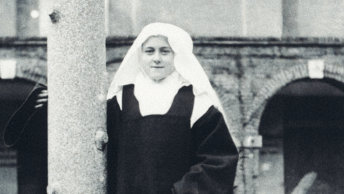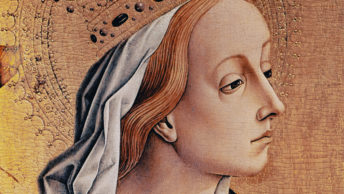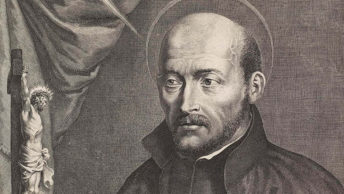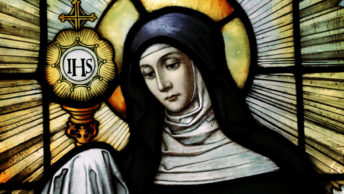There are many saints in the Church and each embodies holiness in a different way. We can say that each highlights a different facet of perfection of the God who is infinitely rich in perfection. St. Dominic is not like St. Francis in many ways, nor is St. Faustina like St. Thomas Aquinas. But St. Dominic, St. Francis, St. Faustina, St. Thomas Aquinas and all the saints are alike in the most critical sense: they each are united to God and behold the beatific vision by seeing God face to face. In short, in the Communion of Saints, there is diversity in unity. It is in this context of diversity within unity that I wish to discuss the unique gift God gave us in the person of St. Therese, doctor of the Church.
St. Therese is the saint for all those who look with wonder at the great giants of our faith and wonder, how could I ever attain such holiness? These great saints she compares to eagles, and she herself is just a little bird who desires to fly like the eagles. Now for most of us, this analogy would cause us to despair and to wonder how are we to ever become a saint. But Therese is undeterred and unafraid. Her answer as to how she can become an eagle is to stay gazing at the Sun, Jesus Christ, allowing His love to lift her up. [1] The Scripture does say in Isaiah 40:31, “But those who hope in Yahweh will regain their strength, they will sprout wings like eagles, though they run they will not grow weary, though they walk they will never tire.” [2] St. Therese teaches us that sanctity does not require great potential. In God’s providence, a tiny bird becomes a soaring eagle, a weak, sinful person becomes a towering saint. The quickest path to sanctity is not climbing the mountain step by step, though that is one way. Rather, the quickest way to be a saint is to lower ourselves and see God as our Heavenly Father. In this way, we become so small and lovingly dependent on God that He cannot resist carrying us Himself to heaven. St. Therese’s teaching is firmly rooted in the fact that God is Father, Abba, daddy. Only in this intimate love between a father and his children, between God and all of us, can one understand why St. Therese is such a gift to the life of the Church.
On this beautiful feast of St. Therese, there are three points I wish to draw out about the relevance of St. Therese’s life and teaching. Firstly, St. Therese’s Little Way of holiness shows that holiness is obtainable for anyone and only requires the slightest bit of good will. Secondly, St. Therese shows us the freedom in love and banishes every trace of scrupulosity or legalism. Thirdly, the profound simplicity of the Gospel shines forth in the life of St. Therese, and this simplicity is key to the New Evangelization.
Considering the first point, the way of spiritual childhood, also referred to as the Little Way, is easy to understand in its essence. It is stated most beautifully by our Lord Himself when He said, “Shoulder my yoke and learn from Me, for I am gentle and humble in heart, and you will find rest for your souls.” [3] Now good mothers and fathers are gentle with their children and their expectations are very humble. All a good father and mother asks is for their baby to allow them to love and serve him or her. When the child takes a step, the parents are not disappointed that the child cannot walk or run. When the child speaks a word, the parents are not disappointed that the child cannot give a speech. When a child reads a word, the parents are not disappointed that their child cannot read a whole book. The parents are joyful because they love their child so much and rejoice at every little success. So our Heavenly Father is not disappointed with us when we fall, but He is happy when we return to Him. All He desires is our love. Just as a mother and father always love their child, no matter how far he or she strays, so God our Father always loves us. So our confidence in the mercy of God, in His goodness and love for us, should be a constant in our lives.
St. Therese herself said that had she committed a mortal sin, which she never did her whole life, [4] her confidence in God would be even greater. Why? Because she knew the merciful love of the Father for the Prodigal Son, [5] and she knew what our Lord later revealed to the Secretary of Divine Mercy, St. Faustina Kowalska: “The greater the sinner, the great the right he has to My mercy.” [6] Of course, in the strict sense, there can never be a “right to mercy,” but our Lord is saying that the more need a person has for mercy, the more they receive. St. Therese received the mercy of never committing a mortal sin, but had she committed such a sin, she would have run with greater confidence into the arms of her Father in Heaven. So the confidence we have in God’s love should never be diminished by our sins, but on the contrary, increased.
The person who follows the way of spiritual childhood, the Little Way, is gentle and humble of heart because he or she has not the least shade of doubt that God loves them. This confidence in the love of God our Father in spite of all things and circumstances is the key to understanding St. Therese. St. Therese shows us that trusting God and believing in authentic love are one and the same, for the God who is love [7] cannot resist our sincere love for Him. She shows us that God can be conquered through love, that is, that God always chooses to subject Himself to love, as He did most significantly be being crucified out of love to restore us to God. From this perspective, we see that heaven is not complicated. Heaven is reserved for those who love God, and this love for God is itself the gift of God who loves all men and wishes all to be saved. [8] This beautiful insight into the heart of God, that all God asks is our sincere love as His children, Pope St. John Paul the Great refers to as “a special charism of Gospel wisdom” that St. Therese shares with the Church. [9] So if you want to be a saint, take courage from St. Therese who teaches that all you need to do is to love God as His beloved child, that is, you simply need to reciprocate the love of God your father. Since it is not hard to love those who love us and since no one loves us more than God Himself, becoming a saint is within everyone’s reach.
Secondly, during the life of St. Therese, the heresy of Jansenism [10] was causing havoc in the Church. Jansenism is the belief that we do not participate in a materially significant way with God’s grace, that some are saved because they cannot resist God’s grace and others are damned because they do not receive God’s grace in sufficient measure to overcome their sins. In truth, God desires the salvation of all and requires that we participate in our salvation by loving Him in return. God’s concern and expectation is that we love Him, not that we be perfect. He Himself loves us into perfection if only we receive His love and choose to respond in kind. In France, St. Therese encountered a rigid emphasis on the judgment of God. Through prayer and contemplative reflection, she came to understand that God’s greatest attribute is mercy, not justice, and that even the justice of God serves His mercy. [11]
This understanding of St. Therese that God’s mercy is primary shows us that God’s love is freeing. Have you ever wondered why children are ordinarily so care free and worry so little? It is because their whole world is summed up in that their parents love them no matter what they do, and they are not afraid of ever losing their love. In the eyes of a child, there is no need for anxiety because mommy and daddy love me. That is precisely what St. Therese teaches about how we should perceive God: there is no need to worry about anything because God my Father loves me and will never cease loving me. From this recognition, we can have confidence in our lives and be truly free of worry and anxiety. As we learn in Galatians 5:1, “Christ set us free, so that we should remain free.” The confidence and freedom to love so essential to holiness is especially emphasized in the beautiful teaching of St. Therese. So remember, God loves you and you are free to love Him back.
Thirdly, there is such harmony between what St. Therese taught and the way she lived that the truth of spiritual childhood shines with greater splendor and simplicity. St. Therese did not merely write about the primacy of God’s love. She trusted Him when she was seriously sick and miraculously cured by Our Lady of Victory. She trusted Him when she experienced the call to enter the life of a cloistered, contemplative nun in Carmel at the tender age of 15. She trusted Him when she had tuberculosis and experienced a trial of spiritual darkness toward the end of her life. In the daily life of a Carmelite religious, she trusted moment by moment in the Bridegroom of her soul and her Father in Heaven. Her words about confident trust in the love of God for us become real in the crucible of suffering she endured out of love for Jesus Christ. St. Therese is known for obtaining roses for souls who seek God’s love, but she is herself a rose from God given to the Church. In St. Therese, we learn once again that the Kingdom of God truly belongs to those who are little and dependent on God. [12] So if you truly desire the Kingdom of God, listen to St. Therese and Jesus Himself and become like little children.
In evangelizing others, the simplicity of St. Therese is essential. We do not need to tell them at first the great truths of our Catholic faith or show them great deeds. What we need is to patiently demonstrate how much God loves them. Once they see that the Kingdom of God consists in the unchanging love of God for them, God will do the rest. This is an invaluable perspective in evangelizing our culture to return to the Sacred Heart of Jesus, the source of life.
May we all imitate St. Therese the Little Flower and recognize that we are loved by our Heavenly Father more than words can ever express. May we also respond to that love as she did and as our Blessed Mother did with her fiat, be it done unto me according to Thy will.
###
[1] St. Therese of Lisieux, The Story of a Soul, available at https://www.olmc-mission.org/storyofasoul.pdf (Pg. 81). [2] The New Jerusalem Bible. [3] St. Matthew 11:29 (New Jerusalem Bible). [4] When St. Therese went to confession at 15 years of age, the priest told her: “In the presence of God, Our Lady, the Angels and all the Saints, I declare that you have never committed a single mortal sin. Thank God for giving you such a grace without any merit on your part.” St. Therese of Lisieux, The Story of a Soul, available at https://www.olmc-mission.org/storyofasoul.pdf (Pg. 42). [5] St. Luke 15:11-32. [6] St. Maria Faustina Kowalska, Divine Mercy in My Soul, 723. [7] 1 John 4:8. [8] 1 Timothy 2:4. [9] Divine Amoris Scientia, 1, available at https://www.littleflower.org/therese/doctor-of-the-church/apostolic-letter-full-text/. [10] https://www.catholic.com/magazine/print-edition/Jansenism. [11] https://www.thedivinemercy.org/library/article.php?NID=2279. [12] Matthew 19:14 (New Jerusalem Bible).







